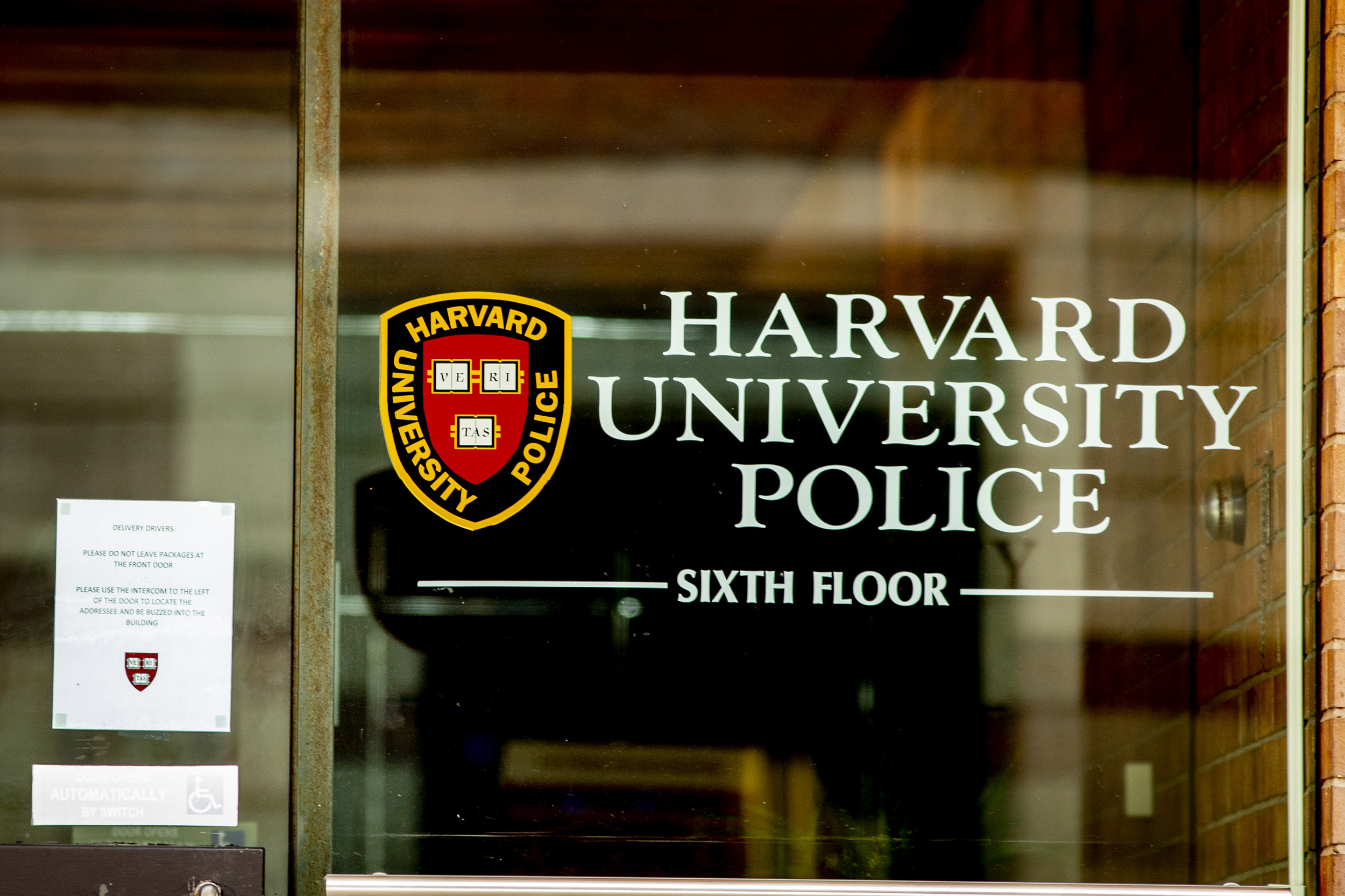
Rose Lincoln/Harvard Staff Photographer
Nationwide search launched for University chief of police
Selection committee will hear from Schools, units, other constituencies
Harvard has launched a nationwide search to hire the University’s next chief of police to fill the position to be vacated by Francis D. “Bud” Riley, who is retiring at the end of December.
A committee representing leaders from across the Harvard community has been convened to conduct the search, and it will actively engage with individuals from across the University’s Schools and units through a series of listening sessions to take place throughout the coming weeks and months. Proposed sessions will focus on the perspectives of undergraduate and graduate students, faculty, staff, mental health practitioners, current Harvard University Police Department (HUPD) members, and those involved in athletics, among others.
“As an educator first, I feel an obligation and a responsibility to create a safe, supportive, and inclusive environment where our players can learn and lead,” said search committee member Tommy Amaker, the Thomas G. Stemberg ’71 Family Endowed Coach for Harvard Men’s Basketball and a special assistant to President Larry Bacow. “I agreed to serve on the search committee because I want that same culture of inclusion for all of Harvard, and I want to ensure that the concerns and voices of all in our community, in particular our Black and minority students, are represented in important community decisions.”
“The next police chief for Harvard needs to be someone who is strongly committed to community policing,” added search committee member Herman B. “Dutch” Leonard, the George F. Baker Jr. Professor of Public Management at Harvard Kennedy School and Eliot I. Snider and Family Professor of Business Administration at Harvard Business School. “This means having a deep and positive relationship between all members of the community and the police department that is helping to provide safety and security for them. And having a relationship like that requires the police force — and, especially, the chief — to understand both the ordinary and the unique features of our community.”
According to Leonard, the next chief will need to understand, and then enact, innovative ways to protect Harvard’s distinctive concerns, which begin with the safety, well-being, and interests of its more than 40,000 diverse students, faculty, staff, and academic personnel, and extend into such areas as understanding the value of, and protecting, high-value intellectual property. The individual will also need to be able to form strong partnerships with organizations across the University, with the neighboring Cambridge and Boston Police Departments, and with the Boston office of the Federal Bureau of Investigation.
“In today’s climate of rethinking the balance of responsibilities between police and other agencies — mental health services providers, for example — Harvard may need to do some of its own reexamination of roles and responsibilities, so our next chief also needs to be able to help us reimagine, recalibrate, and redesign what a police force on a modern university campus should be,” Leonard said.
Vice President for Campus Services Meredith Weenick plans to bring her experiences as co-chair of the Drew Faust-initiated Task Force on Inclusion and Belonging to her role on the search committee.
“We have an opportunity to take a fresh approach to choosing HUPD’s next chief and to listen to the Harvard community along the way,” she said. “Preserving campus safety is its own unique challenge. The next chief will be charged with more than preventing crime; more importantly, this individual must support our students in their quest to push the boundaries of inquiry and in their efforts to effect lasting change to our world’s existing systems and structures. This person will need to understand the diversity of points of view on our campuses and the unique cultures present in our 12 Schools, while championing the virtues of free speech.”
In addition to Amaker, Leonard, and Weenick, the search committee members include: Sherri Charleston, Chief Diversity and Inclusion Officer, Harvard University; Andrew Crespo, Professor of Law, Harvard Law School; Matt Gruber, Dean for Administration, Harvard Law School; Evelynn Hammonds, the Barbara Gutmann Rosenkrantz Professor of the History of Science, Chair of the Department of the History of Science, and Professor of African and African American Studies; Marc Johnson, Associate Dean for Degree Programs, Harvard Graduate School of Education; Sean Kelly, the Teresa G. and Ferdinand F. Martignetti Professor of Philosophy and Faculty Dean of Dunster House; James Mathew, President of the Undergraduate Council; Lisa Muto, Executive Dean for Administration, Harvard Medical School; Katie O’Dair, Dean of Students, Harvard College; Osiris Rankin, Diversity and Inclusion Fellow with the Department of Psychology, and doctoral student in Clinical Psychology; Rob Sampson, the Henry Ford II Professor of the Social Sciences and Sociology Department Chair; Sheehan Scarborough, Senior Director, Harvard Foundation and Interim Director, Office of BGLTQ Student Life; and Sheila Thomas, Dean for Academic Programs and Diversity at the Graduate Schools of Arts & Sciences and Assistant Professor of Medicine, Harvard Medical School.
Earlier this year, Harvard initiated an external review of HUPD focusing on the internal practices and procedures of the department as well as its interactions with community members. While the work of this external committee is distinct from the work of the search committee, both efforts involve a significant assessment and reimagining of the police department’s role, and the candidate selected to fill the chief position will be charged with implementing recommendations emerging from the external review.
Any Harvard community member may offer their opinion on the search process by email to hupdchiefsearch@harvard.edu or hupdexternalreview@harvard.edu.




